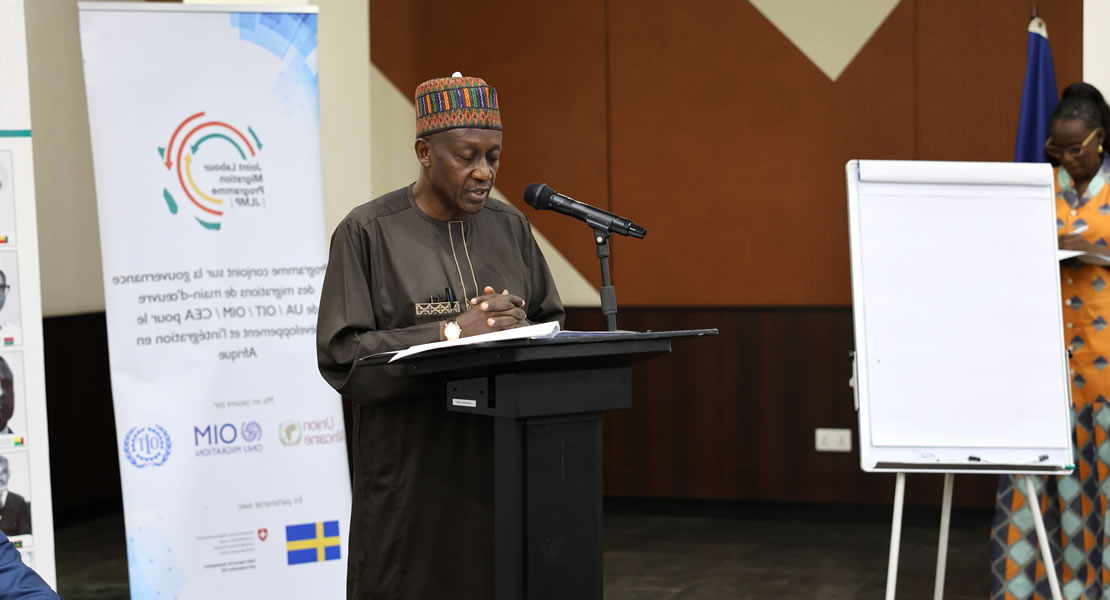
As technical experts from Ministry of Labour within the sub-region gather in Accra for a three day conference on the validation of the ECOWAS Labour Migration Strategy and Action Plan (LMSAP), the Economic Community of West Africa States (ECOWAS) resident representative in Ghana Ambassador Mohammed Lawan Gana has noted that, migrant work force remit forty billion dollars inflow into the ECOWAS every year, supporting education, healthcare, family welfare and small business at the opening of the three-day conference.
According to him in 2019 alone, migrant workers accounted for 2.8% of the continent’s total labour force. Within the ECOWAS region, 3.7 million international migrant workers make contributions in key sectors such as agriculture, construction, mining, domestic work, and services.
These figures underscore the vital role that labour migration plays as a development driver.
Between 2010 and 2019, the number of international migrant workers in Africa grew from 9.6 million to 14.5 million, a 50% increase in less than a decade. The annual growth rate of migrant labour now stands at 4.8%, nearly twice the growth rate of Africa’s general population.
Employment absorption rates are also impressive: 94.6% of migrants in Ghana and 90.1% in Nigeria were successfully integrated into the workforce, showing how crucial migrant workers are to our economies.
Beyond their labour, migrant workers contribute significantly through remittances, which remain a major economic lifeline for millions of families across the Member States.
These figures underscore the vital role that labour migration plays as a development driver. However, to fully harness the potential of labour migration, we must confront several pressing challenges. These include irregular migration, lack of adequate social protection for migrant workers, weak governance structures, limited data and research, and the continued marginalization of women and other vulnerable groups in migration policy and practice.
It is against this backdrop that the ECOWAS Labour Migration Strategy and Action Plan has been developed. The Strategy sets out five key strategic objectives – each targeting a crucial pillar of effective labour migration governance.
The first is to promote regular migration, labour mobility, and human security. This objective aims to create safe, legal, and well-regulated migration pathways, reduce the risks of exploitation and trafficking in persons, and ensure that people can move in dignity to find decent work.
The second objective focuses on protecting the rights of migrant workers. No migration system is complete without safeguarding the dignity and well-being of those who sustain it. This pillar calls for strengthened labour rights, fair recruitment practices, access to justice, and social protection for migrant workers. It also encourages the signing of bilateral labour agreements and promotes decent working conditions for both men and women, especially in the informal economy.
As the third objective is to maximize the development impact of labour migration. Migration must benefit both people and economies. This includes enhancing financial literacy among migrants, supporting reintegration programs for returning workers, and ensuring that migration is integrated into national and regional development plans.
Fourth objective aims to strengthen regional cooperation and governance. Labour migration transcends national borders, and so must our collective response. The Strategy proposes stronger institutional frameworks, improved coordination among ECOWAS Member States, and harmonized data systems and standards. A Technical Coordination Committee on Migration will oversee implementation, supported by a soon-to-be-established Labour Migration Technical Working Group.
And the last objective is to ensure gender and social inclusion in migration policies. This involves crafting gender-responsive and youth-focused policies while also protecting the rights and welfare of women, children, and persons with disabilities. Inclusion must be central to every step of our migration governance.
This Strategy is the product of strong leadership from ECOWAS, with critical support from the Joint Labour Migration Programme (JLMP), the International Organization for Migration (IOM), the International Labour Organization (ILO), the Free Movement of Persons (FMP) initiative, and our donor partners. We also deeply appreciate the active involvement of Member States, many of whom are here today to review and validate the Strategy.
“What we present today is more than a policy document, it is a commitment; a commitment to protect and empower migrant workers. A commitment to ensure that migration is a choice, not a necessity; a commitment to align regional migration, governance with continental frameworks, including the AU’s Free Movement Protocol and the JLMP”.
He urged the media and their partners to tell the story and help shine light on the experiences of the millions of migrant workers who seek not just employment, but dignity, safety, and opportunity.
Use your platforms to raise awareness about this Strategy and the hope it offers for a better-managed, more humane, and more effective labour migration system in West Africa. The dream is to work towards a future where migration is safe, orderly, dignified, and beneficial for all, he added.
Kwaku Sakyi-Danso/Ghanamps.com